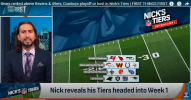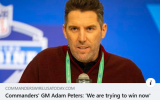- Thread starter
- #1
I considered whether or not to write and post this over this past week and decided that the deciding question centered on @dad. He promised an in-depth look at reasons not to make the big splash until next year because this one (2024), is all about "seeing what we have," and building upon that in the predictions thread.
After careful consideration, He (@dad) is much more in line with the current management of the team than I, and the following will outline why such reasoning leads to a long-term, sooner-than-necessary quandary.

Take note of the tier caption, "We're just here for the QB," which agrees with @dad and the current management team. While it isn't unreasonable to play it out this way, i.e. proved certainty over speculation, such positions also are evidence of a certain lack of confidence in the QB going into the current season. That said, there's no reason to take the field with any pretense to want to win if '"evaluation' is the goal. The one problem I have with this approach happens to be there is a pretense at the highest levels. C'mon!, Adam Peters, back me up on this one...

Here's the thing, I believe that he believes this, but action being louder than words, rings hollow because "win" becomes subjective and there were moves that could have been made to shore up known weak spots and give the team greater chances to win more games. Perhaps Peters has been operating under instruction from new team owner Josh Harris, who has expressed a strong commitment to improving the team’s performance. In a recent press conference, he emphasized the importance of building a winning culture and attracting the best talent, famously or infamously adding this caveat to this year's team... "They should perform better than last year's four-win season." What that means is anybody's guess.
An interesting comparison is the Chicago Bears who similiarly will be starting a rookie QB but opted to load their team with talents that suggest that they have full confidence in their rookie and doing all that they can to make a playoff push now win their division despite the odds. They've completely skipped the first year, more conservative, "evaluation" process in favor of keeping open their rookie contract Super Bowl window longer than the aforementioned slower approach. Here's why...
Successful quarterbacks often receive new contracts around the end of their third or fourth year in the NFL. This timing allows teams to evaluate their performance over a few seasons before committing to a long-term deal. For example, Patrick Mahomes signed his massive extension with Kansas City after his third season. Similarly, Josh Allen received his new contract from Buffalo, after his third year. Other more recent post-third year new contracts include: Trevor Lawrence, Joe Burrow, Justin Herbert, and Jalen Hurts.
This trend helps teams lock in their franchise quarterbacks before they hit free agency, ensuring stability and continuity for the team’s future.
The best chance for any team to reach the Super Bowl is when the quarterback is working on his rookie contract. After that, teams are obligated to reward quarterbacks with rich contract extensions, which means less money to build the rest of the team.
The urgency to win in the NFL while a quarterback (QB) is on a rookie contract stems from the financial flexibility it provides. This combination of financial flexibility and the ability to build a more balanced team creates a sense of urgency for teams to capitalize on the opportunity to win while their QB is still on a cost-effective rookie deal.
So Sty how on earth does this translate to a long-term mistake for the Commanders? (people want to know)
Their current approach leaves them with a one-year window to get it done, it being a Super Bowl appearance and hopefully a win. Here's the breakdown... (optimistically)
1. Year one, due to uncertainty, a lack of confidence, and/or this more conservative approach, became exactly as @dad stated it to be, "an evaluation year!" (Daniels proves himself)
2. Year two, they load up through the draft, free agency, and trade, essentially becoming what Chicago is now, a team in a position to make a serious playoff push.
3. Year three, the window, and they're ready to etch their names on a Lombardi come hell or high water. This team is loaded and favored to get there. Daniels now entering his third year has further cemented himself as the unquestioned QB of the franchise, because they don't lose games, they win them.
So what's the problem??
Oh, wait, what was that little thing mentioned in the last part of year three? His third season and typically the year after which you're going to pay your QB and lose all of the financial flexibility used to build the SB team. Now cuts have to be made, your one-year SB window closes or is closing and you're putting more responsibility on your QBs shoulders. Some people will be completely satisfied with an outcome like this and that's fine, the question to them becomes, of course, is it a mistake in failing to make that initial push as the Bears are doing with a two-year window in sight, in favor of the three-year plan that nets a one-year rookie contract window?
After careful consideration, He (@dad) is much more in line with the current management of the team than I, and the following will outline why such reasoning leads to a long-term, sooner-than-necessary quandary.

Take note of the tier caption, "We're just here for the QB," which agrees with @dad and the current management team. While it isn't unreasonable to play it out this way, i.e. proved certainty over speculation, such positions also are evidence of a certain lack of confidence in the QB going into the current season. That said, there's no reason to take the field with any pretense to want to win if '"evaluation' is the goal. The one problem I have with this approach happens to be there is a pretense at the highest levels. C'mon!, Adam Peters, back me up on this one...

Here's the thing, I believe that he believes this, but action being louder than words, rings hollow because "win" becomes subjective and there were moves that could have been made to shore up known weak spots and give the team greater chances to win more games. Perhaps Peters has been operating under instruction from new team owner Josh Harris, who has expressed a strong commitment to improving the team’s performance. In a recent press conference, he emphasized the importance of building a winning culture and attracting the best talent, famously or infamously adding this caveat to this year's team... "They should perform better than last year's four-win season." What that means is anybody's guess.
An interesting comparison is the Chicago Bears who similiarly will be starting a rookie QB but opted to load their team with talents that suggest that they have full confidence in their rookie and doing all that they can to make a playoff push now win their division despite the odds. They've completely skipped the first year, more conservative, "evaluation" process in favor of keeping open their rookie contract Super Bowl window longer than the aforementioned slower approach. Here's why...
Successful quarterbacks often receive new contracts around the end of their third or fourth year in the NFL. This timing allows teams to evaluate their performance over a few seasons before committing to a long-term deal. For example, Patrick Mahomes signed his massive extension with Kansas City after his third season. Similarly, Josh Allen received his new contract from Buffalo, after his third year. Other more recent post-third year new contracts include: Trevor Lawrence, Joe Burrow, Justin Herbert, and Jalen Hurts.
This trend helps teams lock in their franchise quarterbacks before they hit free agency, ensuring stability and continuity for the team’s future.
The best chance for any team to reach the Super Bowl is when the quarterback is working on his rookie contract. After that, teams are obligated to reward quarterbacks with rich contract extensions, which means less money to build the rest of the team.
The urgency to win in the NFL while a quarterback (QB) is on a rookie contract stems from the financial flexibility it provides. This combination of financial flexibility and the ability to build a more balanced team creates a sense of urgency for teams to capitalize on the opportunity to win while their QB is still on a cost-effective rookie deal.
So Sty how on earth does this translate to a long-term mistake for the Commanders? (people want to know)
Their current approach leaves them with a one-year window to get it done, it being a Super Bowl appearance and hopefully a win. Here's the breakdown... (optimistically)
1. Year one, due to uncertainty, a lack of confidence, and/or this more conservative approach, became exactly as @dad stated it to be, "an evaluation year!" (Daniels proves himself)
2. Year two, they load up through the draft, free agency, and trade, essentially becoming what Chicago is now, a team in a position to make a serious playoff push.
3. Year three, the window, and they're ready to etch their names on a Lombardi come hell or high water. This team is loaded and favored to get there. Daniels now entering his third year has further cemented himself as the unquestioned QB of the franchise, because they don't lose games, they win them.
So what's the problem??
Oh, wait, what was that little thing mentioned in the last part of year three? His third season and typically the year after which you're going to pay your QB and lose all of the financial flexibility used to build the SB team. Now cuts have to be made, your one-year SB window closes or is closing and you're putting more responsibility on your QBs shoulders. Some people will be completely satisfied with an outcome like this and that's fine, the question to them becomes, of course, is it a mistake in failing to make that initial push as the Bears are doing with a two-year window in sight, in favor of the three-year plan that nets a one-year rookie contract window?
Last edited:



















